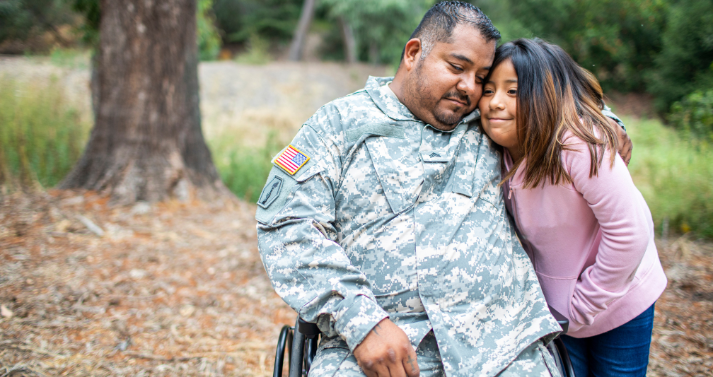Motivational Interviewing Training Online Veterans: 4 MI Tips for Working with Veterans

Every year, we set aside time to honor our nation’s veterans, our nation’s heroes.
What comes to mind when you think about Veterans Day?
For me, this brings images of my grandfathers, each in their uniforms from WWII, of the beautiful Veterans cemetery here in Asheville next to where my parents live, of the black POW/MIA flag (Prisoners of War & Missing in Action), and of our nation’s flag. I think of the bell chiming at the VA Medical Center where I spent 9 years as a social worker, and all that I learned from the Veterans there, and it brings to me deep gratitude for every single person who has served our country.
In some ways, Veterans taught me Motivational Interviewing.
You see, I was a newly graduated social worker when I began my federal service at the VA. I had no formal training in Motivational Interviewing then. I was eager, ready to help, chocked full of ideas and services to link vets to… I was ready to help them make the changes they needed!
And the Veterans didn’t trust me. They knew right away I was not a vet myself. They saw my naive eagerness to help.
Sure, the veterans showed me respect when I talked about all resources and ideas for them to change. (In my experience, Veterans demonstrate so much respect!)
And then, they would not do a single thing I had recommended.
I was getting frustrated and burned out, working hard with my clients but not getting very far.
And then I took my first course in Motivational Interviewing.
I watched the relationships with the Veterans I worked with deepen, as I talked less and listened more. I stopped trying to prove myself by efforting and posturing, and got more curious about their experiences. I stopped trying to come up with solutions for them, and evoked their ideas. And I learned how essential it was to be genuine.
Ya’ll, Motivational Interviewing is a game changer!!
So here are my 4 MI tips for working with Veterans:
- Talk less, listen more. If you find yourself filling awkward silences, falling into the small talk trap, sharing your experience or thoughts on things, pull the cotton balls out of your ears and put them in your mouth!
- Get curious. Sure, you may not be a Veteran yourself, and may find yourself trying to establish trust and rapport by sharing about your resume or credentials, people you know who are Veterans, or sharing all you do know about the military. Release the need to know and get curious! Ask open-ended questions, and practice deep listening. Every Veteran has their own unique experience!
- Stop making suggestions and ask! Before you share your ideas for a Veteran, or resources, or give advice, ask what they already know! Ask what ideas they have about their dilemma! They know more about their lives than we do, and are more likely to have good ideas that will work for them. Get to know their values and mission, and offer support in getting them there!
- Genuineness is everything. Veterans can see BS a mile away. Don’t try to know more than you do about their service time, don’t even try! Be you, be humble, be real. It’s the only chance you have of earning their respect and trust.
I have so much more for you related to Motivational Interviewing and Veterans!
- Do you want to support Veterans and their families, but hesitate because you don’t know how to do this well?
- Do you struggle understanding Military culture and have a difficult time connecting with the Veterans you work with?
- Would you benefit from more orientation to Military and Veteran culture?
In honor of Veterans Day, we are offering you this 2-hour workshop on the applications of Motivational Interviewing (MI) in working with Veterans. Join US Marine Corps Veteran Brandon Wilson and MINT member Hillary Bolter as we’ll examine what happens to a Veteran’s identity and way of life after serving in the military. We will explore the challenges and opportunities in supporting the Military Connected Community with the intersectionality of MI. We’ll consider the military’s tribal and close culture, as well as other aspects of military service that can impact mental health including self-denial, combat experiences, the “warrior” ethos, the importance of honor and respect, sense of purpose or mission, operational intent, task-oriented thinking, and military family life. We’ll also explore the stages of transition and reintegration to civilian life and ways MI can effectively impact engagement with Veterans and their families.
What you get:
-Access to Motivational Interviewing Training Online Course video & corresponding handouts
-30 days access to the Motivational Interviewing Training Online Course
-Certificate for 2 hours of Continuing Education upon completion of course, quiz, and evaluation (we are a NBCC approved provider!)
Watch my full video here on 4 tips supporting veterans with MI!
Related Posts

What is Macro Motivational Interviewing?
Did you know that Motivational Interviewing is being applied to systems work? It’s called macro MI! One of the limitations of traditional approaches to Motivational Interviewing (MI) is the narrow focus on individual behavior change. Yet we know that an individual is...
Related Posts

Motivational Interviewing for SELF Change!
You may be recovering from the intensity of the holidays, or perhaps your holiday season was rejuvenating and nourishing. Or, a little of both?! First of all, HAPPY NEW YEAR! Don’t fall into the New Year's Resolutions trap! Only 9% of people actually complete New...

Let’s Learn Together!
Hi, I’m Hillary Bolter. At MI Center for Change, Motivational Interviewing is our passion. Motivational Interviewing will help you become more effective and efficient as you support clients’ change!

